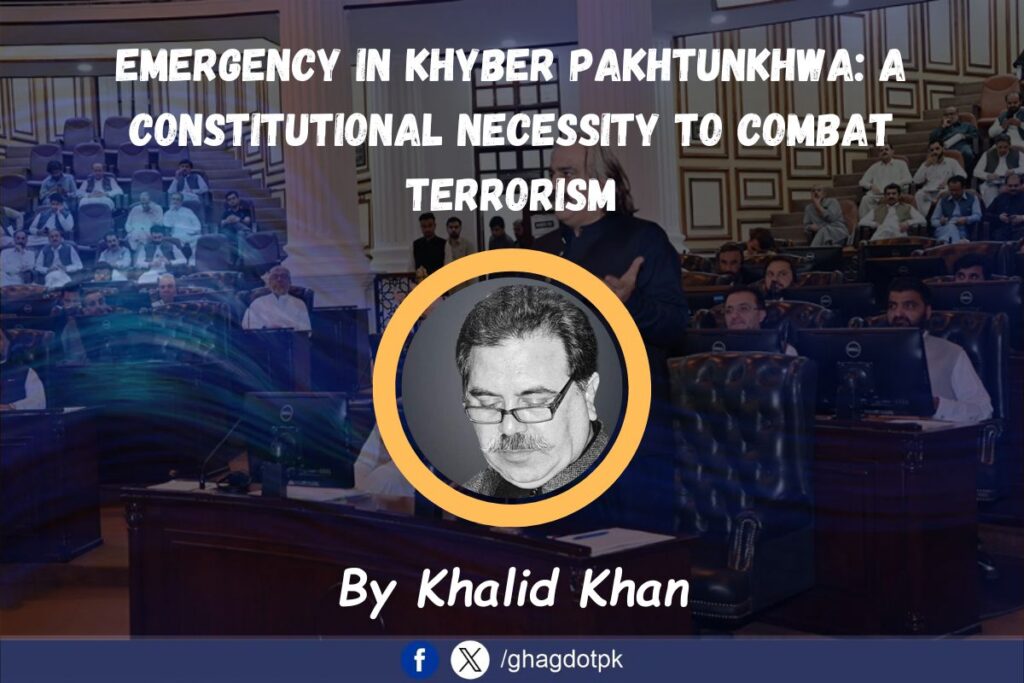By Khalid Khan
The deteriorating law and order situation in Khyber Pakhtunkhwa (KP) has reached an alarming threshold, demanding immediate and extraordinary measures. With the civil administration failing to address escalating terrorist activities, the imposition of emergency under Article 232 of the Constitution appears to be the only viable option to restore stability and protect the lives of innocent citizens.
KP has seen a resurgence of terrorist attacks in 2024, particularly in Dera Ismail Khan, Bannu, Lakki Marwat, South and North Waziristan, Peshawar, and Mardan. Recent statistics are both shocking and tragic:
1. Increase in Terrorist Incidents:
Between January and October 2024, KP experienced over 500 terrorist attacks, a staggering 40% increase compared to the same period in 2023.
These attacks have resulted in over 1,200 casualties, including nearly 400 civilian deaths.
2. Targeting of Law Enforcement:
More than 150 security personnel have been martyred, and dozens injured in ambushes and bomb blasts.
Police morale is at an all-time low, with inadequate resources to combat the heavily armed and well-organized militant groups.
3.Civilian Toll:
The attack on a convoy in Lower Kurram that left 31 dead and over 50 injured is just one example of the carnage inflicted on ordinary citizens.
Women and children have not been spared, further exacerbating the sense of insecurity.
4. Administrative Paralysis:
Civil administration has shown a glaring inability to respond effectively, with delayed actions, inadequate crisis management, and a lack of coordination between security forces and local authorities.
The Failure of Civil Administration
The civil government in KP has demonstrated a dismal failure in maintaining law and order:
Ineffectiveness of Leadership:
The provincial leadership has remained embroiled in political confrontations rather than focusing on governance. Chief Minister Ali Amin Gandapur’s administration has been conspicuously absent in addressing the worsening security situation.
Lack of Strategic Planning:
Despite repeated attacks, there is no visible counter-terrorism strategy in place. The National Action Plan (NAP), once considered a framework for combating terrorism, has been all but abandoned.
Public Distrust:
Citizens have lost faith in the government’s ability to protect them. Protests against the government’s failure to ensure security are becoming increasingly common.
Why Emergency is Necessary
The declaration of emergency is not a decision to be taken lightly, but the situation in KP justifies it on several grounds:
1. Constitutional Provision:
Article 232 of the Constitution allows for the declaration of emergency when there is a breakdown of law and order that threatens the security of the country or any part of it. KP’s current security crisis fits this criterion.
2. Strengthening Security Operations:
An emergency declaration would empower federal authorities to coordinate and execute counter-terrorism operations more effectively. It would allow for the deployment of additional forces and resources without bureaucratic delays.
3. Restoring Public Confidence:
The imposition of emergency would signal to the citizens of KP that the state is taking decisive action to protect them. It would also deter militants by demonstrating the government’s resolve to restore law and order at any cost.
4. Reviving Governance:
Emergency rule would allow for the temporary suspension of ineffective provincial leadership and enable direct federal intervention to address the administrative vacuum.
Counter Arguments and Their Rebuttals
1. Risk of Political Backlash:
Critics may argue that emergency undermines democratic processes. However, the lives and safety of citizens take precedence over political considerations. Emergency measures are meant to be temporary, with the sole purpose of restoring normalcy.
2. Perception of Militarization:
Some may view emergency as excessive militarization. However, given the scale of the threat, security forces must be given the authority to act decisively. This is not about militarization but about ensuring security.
3. Economic Impact:
While an emergency may initially disrupt economic activities, continued instability is far more damaging in the long run. A secure environment is essential for economic growth and investment.
Conclusion
The current security and administrative crisis in Khyber Pakhtunkhwa leaves no room for complacency. The provincial government’s failure to protect its citizens and combat terrorism necessitates federal intervention through the declaration of emergency. This is not a matter of politics but of survival for the people of KP.
As citizens of Pakistan, we must recognize the gravity of the situation and support measures that prioritize safety and stability. Emergency in KP is not just a constitutional option—it is a moral imperative.
Khalid Khan is a senior Pashtun journalist, author, and analyst. Known for his unwavering advocacy for peace, he is currently the editor of the English section of Ghag. His extensive experience in regional journalism brings a profound understanding of the complexities and challenges faced by Khyber Pakhtunkhwa.






